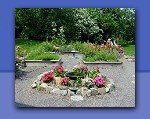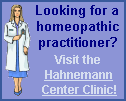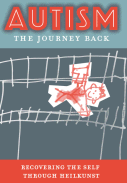|
"Proving" a Remedy in Disease Treatment
Notes by Rudi Verspoor, 1997

It is often stated in homeopathy during treatment that one is "proving" a remedy. What exactly does this mean?
The statement is usually made in the case of new symptoms that arise and are perceived as an aggravation by the patient and a worsening of the disease state of the patient by the homeopath. The homeopath then feels the need to antidote the remedy given.
There is a short answer to the question, namely that a proving is technically only that reaction of the remedy on healthy people. So, technically, the reaction to a remedy in a sick person cannot be a proving. However, this answer doesn't really teach us anything about the issue.
As with many issues in homeopathy, several issues get confused in the statement that something during treatment is a proving. So, we need to look at the long answer!
Healing Reaction and Homeopathic Aggravation
First, we need to distinguish between a homeopathic aggravation and a healing reaction. The former occurs due to the remedy creating an initial state similar to that of the natural disease. This is detailed in Aphorisms 156-161. The analogy of fighting fire with fire is useful here - when the two fires meet, the one started by nature and the man-made one, there is a momentary intensification of the fire, then the fire dies out. This homeopathic aggravation involves the generative power.
In the case of homeopathic aggravations, this is linked essentially to acute diseases. In Aphorism 156, Hahnemann talks of acute disease treatment. He then says that the aggravation, which occurs in the first minutes or hours (unless a strong material dose is given), and is not very strong, is removed easily by the life force.
ß. 156.2.
But this (in a good case) insignificant deviation is easily wiped away by the living organism's own energy activity (autocracy), and even unnoticeably to patients of not immoderate delicacy; the restoration, nevertheless, proceeds on to the goal of recovery, when it is not hampered by extraneous medicinal influences on the patient, by faults in regimen or by passions.
ß. 157.1.
As certain as it is, however, that a homeopathically selected remedy,on account of the appropriateness and smallness of its dosage, quietly voids and annihilates the acute disease analogous to it without amplification of its remaining non-homeopathic symptoms, that is, without arousal of newer, more significant ailments, it is nevertheless usual (but likewise only with a dosage not properly diminished) for it to actuate a kind of small aggravation in the first hour or [few] hours immediately after taking it (one lasting several hours, however, with a dosage somewhat too large), which has so much similarity to the original disease, that it appears to the patient to be an aggravation of his own malady.
ß. 161.1.
When I place the so-called homeopathic aggravation, or rather the initial-action of the homeopathic medicine, appearing to somewhat heighten the symptoms of the original disease, within the first hour or the first few hours, this is thus certainly the case with the more acute, recently arisen maladies; but when medicines of longer active duration have to combat an old or very old sickness, no such apparent heightenings of the original disease may show themselves during the course of treatment and do not show themselves if the aptly selected medicine in properly small, only gradually heightened doses becomes somewhat modified every time by new dynamization (ß247);a] such heightenings of the original symptoms of the chronic disease can then only come to light at the end of such treatments when the cure is almost or entirely completed.
In this last aphorism, Hahnemann says that the homeopathic aggravation seldom shows in chronic cases, and not at all until the end of the treatment if the new LM potencies are used.
The healing reaction is the result of the life force trying to restore balance against the provocation of the artificial disease (remedy) (called the back-action). This action involves the sustentive power (the aspect of the life force involved in diet and regimen and homeostasis). See Aphorisms 63-64.
In fact, the disease symptoms one experiences are really due to this after-action or counter-action of the sustentive aspect of the life force in the face of a disease agent which has affected the generative aspect of the life force.. The symptoms one comes to the homeopath with are not the disease, but the efforts of the sustentive power to re-establish balance in the life principle of the organism.
Acute and Chronic Disease
The next thing we must realize is the distinction made by Hahnemann between acute and chronic disease. Most of Hahnemann's comments in the Organon, you must remember, relate to the cure of acute diseases and these aren't necessarily valid for chronic or protracted diseases.
This then raises the distinction between natural diseases and artificial ones. Natural diseases are engendered by natural disease potences (such as microbes or natural events - accidents, such as contusion diseases, or emotional shocks, such as grieving diseases).
Artificial diseases involve synthetic agents, such as drugs or chemicals, so-called iatrogenic diseases, which Hahnemann calls protracted diseases. See Aphorism 41.(It should be noted here that protracted disease can also refer to the long lasting belief states described by Hahnemann in the Organon, footnote 17a and demonstrated in Sankaran's works)
Hahnemann doesn't spend much time on these last ones except to despair of curing them!
ß75.1.
These botchings of the human condition produced by the allopathic calamitous art (at its worst in recent times) are among all chronic diseases the saddest, the most incurable, and I regret to say that when they have been driven to some height, remedies never indeed seem to be able to be invented or devised for them.
Artificial and Natural Disease
The next aspect of the issue is the power of remedies, as artificial disease potences, to alter the state of health in everyone (this is the basis of the provings and the power to cure), unlike natural disease potences which can only affect some people. Of course, this potential is affected by one's make-up in the case of the provings.
ß.136.1.
Although, as said, a medicine during its proving in the healthy state cannot generate all of its condition-alterations in one person, but only in many different, divergent body and soul constitutions, however, the tendency thus lies in it (ß117) to arouse all of these symptoms in each person according to an eternal, immutable natural law, by virtue of which, all of its actions, even those seldom generated by it in healthy people, are brought to bear in each person to whom it is administered in a disease state of similar ailments, homeopathically chosen, it then silently arouses, even in the least dosage, an artificial disease state in the patient, approximating to the natural disease state, which rapidly and permanently (homeopathically) frees and cures him from his original malady.
So, the power of the remedies is universal in that the full power of the remedy (determined through provings) is brought to bear on the sick person.
Three Possible Situations
It seems, then, that three situations involving new symptoms can be involved from the giving of a remedy, in order of likelihood:
To the extent that a new symptom is brought up by the remedy given (the initial action), it is a part of the curative process and will then disappear. To the extent that a symptom is new, but is not related to the disease of the remedy given, but to another disease (being brought forward by the efforts of the life force to heal), it is a symptom to be prescribed for with a new remedy. To the extent that the remedy does not correspond to any disease pre-existing in the person, it could be the case of the remedy engendering an artificial disease (iatrogenic). However, it is a disease, given the smallness of the dose, that is quickly and easily removed by the life force (as is the case where the remedy annihilates the natural disease and is then overcome by the life force - the curative reaction).
In Aphorisms 162 and then again in 180-181, Hahnemann addresses the issue of new symptoms. This is addressed as far as the cure of natural diseases is concerned.
First, there can be two situations:
- Where there is a dearth of homeopathic remedies so the one fitting all the symptoms cannot be found.
- Where the case has a dearth of symptoms (one-sided cases) so that the remedy selected is only imperfectly homeopathic.
In the first case, Hahnemann states that the emergence of "accessory symptoms" is not a problem for eventual cure. However, in acute cases, the homeopath should not wait, but prescribe on the basis of the new, now altered disease state (Aphorism 167).
In the second case, Hahnemann is clear that the new symptoms, while induced by the remedy, are really part of the disease state, hidden from view and now brought to the surface:
§. 180.1.
The medicine selected as well as possible to be sure, but only incompletely because of said cause, will, in its action against the disease, arouse accessory ailments only in part analogous to it — just as in the above mentioned case (§162), where the dearth of homeopathic remedies alone left the selection incomplete — and will mix several occurrents out of its own set of symptoms into the condition of the patient, which occurrents are, however, at the same time, ailments of the disease itself, although rarely or never felt up till now; occurrents will disclose themselves or develop to a higher degree which the patient shortly before had not perceived at all or not distinctly.
§. 181.1.
Let it not be interposed that the accessory ailments now appearing and the new symptoms of this disease were to be laid to the account of the medicament just used.
§. 181.2.
They do come from it;a] but they are however only such symptoms for whose appearance this disease, and also in this body, was already capable of in itself, and which were merely prompted to appear by the medicine used — autogenic of similar symptoms.
§. 181.2. a]
When they were not caused by an important fault in regimen, a violent passion, or a stormy development in the organism, eruption or departure of menstruation, conception, childbirth, etc.
§. 181.3.
In a word, one has to accept the entire symptom complex, now become visible, as belonging to the disease itself, as the present true state, and to manage it further accordingly.
So, it seems clear, at least for natural diseases, that the emergence of new symptoms is part of the underlying disease (entire symptom complex) and is to be considered as positive, either leading to eventual cure or providing a basis for a second prescription. There does not seem to be any issue here of "proving a remedy" in the sense of this being due solely to the remedy and being negative for cure.
Regardless, Hahnemann makes clear that the action of taking a remedy, the proving, cannot be considered to be a negative thing for health.
ß. 141.1.a] 10.
Let him not imagine such small illnesses due to proving medicines be generally detrimental to his health.
ß. 141.1.a] 11.
Experience teaches, on the contrary, that the organism1 of the prover
along with all artificial and natural disease malignities,
and also more seasoned against everything that is detrimental by means of such moderate self-provings with medicines.
ß. 141.1.a] 12.
His health becomes more invariable; he becomes more robust, as all experience teaches.
In summary, the emergence of a new symptom is part of the curative action. To say that this is "a proving" is technically not correct, and to imply thereby that this is negative is also not well founded.
1 Organism - a living presence with properties (corpus), accomplishments (i.e. warding off malignities)
[ Back to Articles ] [ Top of page ]
| 



